towing FORD F750 2003 10.G Owners Manual
[x] Cancel search | Manufacturer: FORD, Model Year: 2003, Model line: F750, Model: FORD F750 2003 10.GPages: 248, PDF Size: 2.54 MB
Page 9 of 248
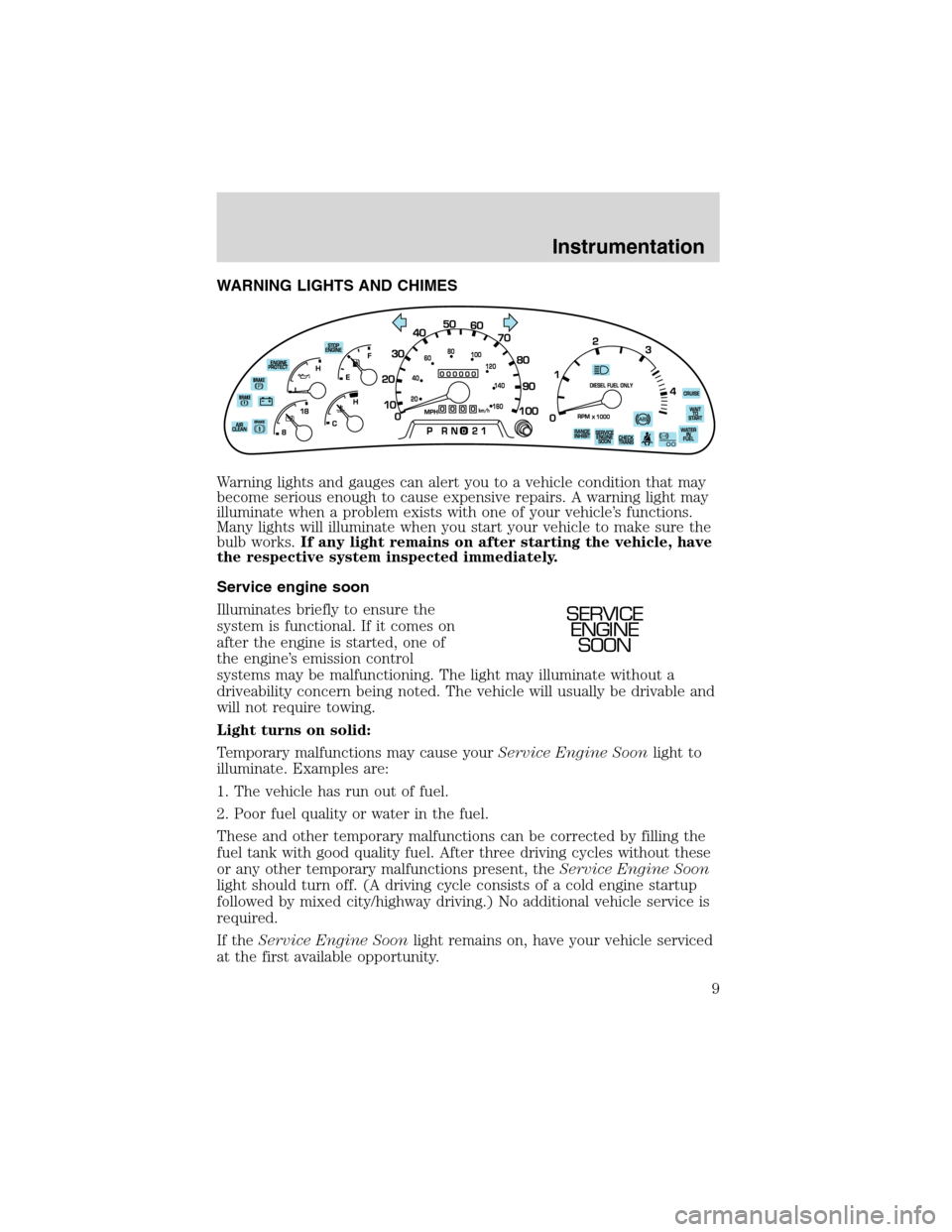
WARNING LIGHTS AND CHIMES
Warning lights and gauges can alert you to a vehicle condition that may
become serious enough to cause expensive repairs. A warning light may
illuminate when a problem exists with one of your vehicle’s functions.
Many lights will illuminate when you start your vehicle to make sure the
bulb works.If any light remains on after starting the vehicle, have
the respective system inspected immediately.
Service engine soon
Illuminates briefly to ensure the
system is functional. If it comes on
after the engine is started, one of
the engine’s emission control
systems may be malfunctioning. The light may illuminate without a
driveability concern being noted. The vehicle will usually be drivable and
will not require towing.
Light turns on solid:
Temporary malfunctions may cause yourService Engine Soonlight to
illuminate. Examples are:
1. The vehicle has run out of fuel.
2. Poor fuel quality or water in the fuel.
These and other temporary malfunctions can be corrected by filling the
fuel tank with good quality fuel. After three driving cycles without these
or any other temporary malfunctions present, theService Engine Soon
light should turn off. (A driving cycle consists of a cold engine startup
followed by mixed city/highway driving.) No additional vehicle service is
required.
If theService Engine Soonlight remains on, have your vehicle serviced
at the first available opportunity.
SERVICE
ENGINE
SOON
Instrumentation
9
Page 150 of 248
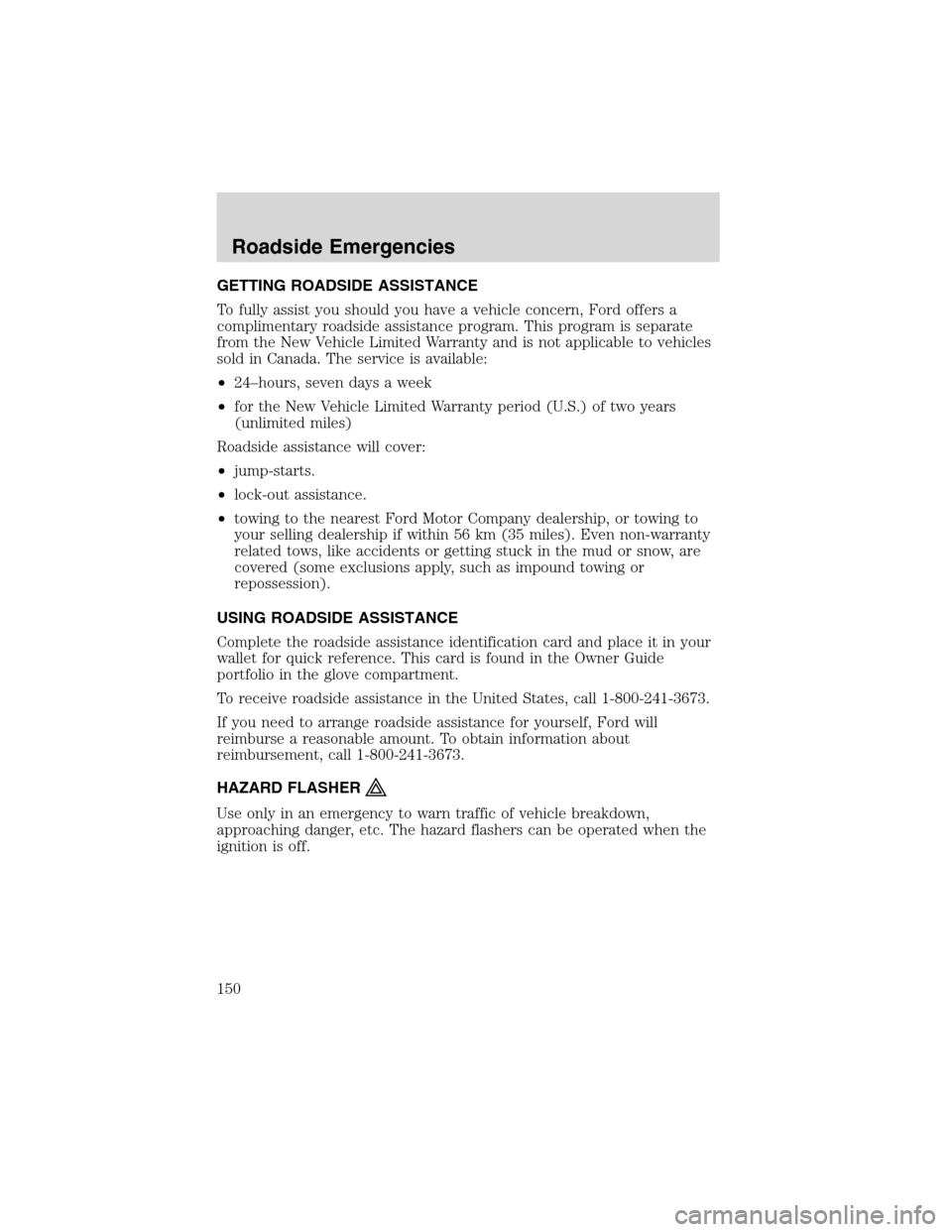
GETTING ROADSIDE ASSISTANCE
To fully assist you should you have a vehicle concern, Ford offers a
complimentary roadside assistance program. This program is separate
from the New Vehicle Limited Warranty and is not applicable to vehicles
sold in Canada. The service is available:
•24–hours, seven days a week
•for the New Vehicle Limited Warranty period (U.S.) of two years
(unlimited miles)
Roadside assistance will cover:
•jump-starts.
•lock-out assistance.
•towing to the nearest Ford Motor Company dealership, or towing to
your selling dealership if within 56 km (35 miles). Even non-warranty
related tows, like accidents or getting stuck in the mud or snow, are
covered (some exclusions apply, such as impound towing or
repossession).
USING ROADSIDE ASSISTANCE
Complete the roadside assistance identification card and place it in your
wallet for quick reference. This card is found in the Owner Guide
portfolio in the glove compartment.
To receive roadside assistance in the United States, call 1-800-241-3673.
If you need to arrange roadside assistance for yourself, Ford will
reimburse a reasonable amount. To obtain information about
reimbursement, call 1-800-241-3673.
HAZARD FLASHER
Use only in an emergency to warn traffic of vehicle breakdown,
approaching danger, etc. The hazard flashers can be operated when the
ignition is off.
Roadside Emergencies
150
Page 164 of 248
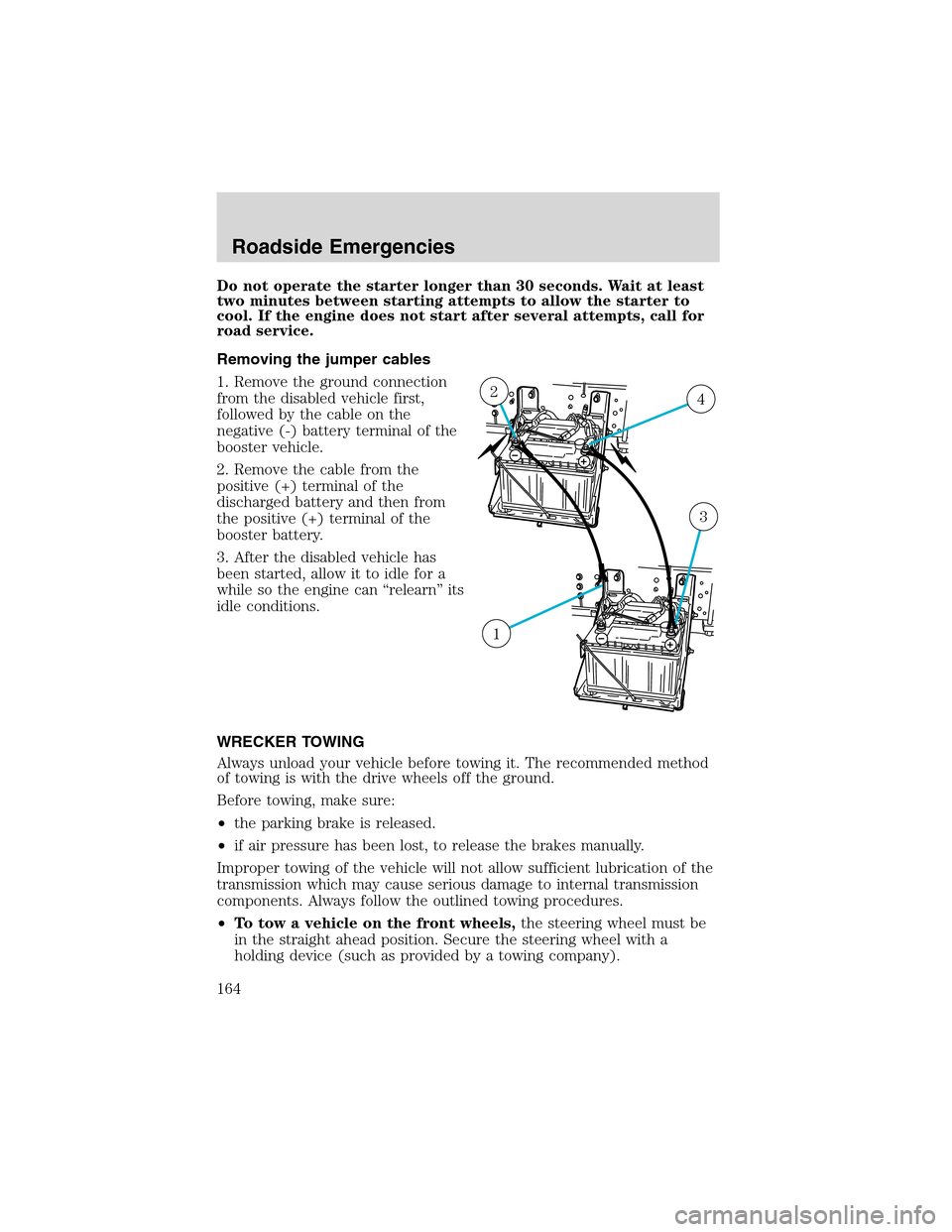
Do not operate the starter longer than 30 seconds. Wait at least
two minutes between starting attempts to allow the starter to
cool. If the engine does not start after several attempts, call for
road service.
Removing the jumper cables
1. Remove the ground connection
from the disabled vehicle first,
followed by the cable on the
negative (-) battery terminal of the
booster vehicle.
2. Remove the cable from the
positive (+) terminal of the
discharged battery and then from
the positive (+) terminal of the
booster battery.
3. After the disabled vehicle has
been started, allow it to idle for a
while so the engine can“relearn”its
idle conditions.
WRECKER TOWING
Always unload your vehicle before towing it. The recommended method
of towing is with the drive wheels off the ground.
Before towing, make sure:
•the parking brake is released.
•if air pressure has been lost, to release the brakes manually.
Improper towing of the vehicle will not allow sufficient lubrication of the
transmission which may cause serious damage to internal transmission
components. Always follow the outlined towing procedures.
•To tow a vehicle on the front wheels,the steering wheel must be
in the straight ahead position. Secure the steering wheel with a
holding device (such as provided by a towing company).
42
3
1
Roadside Emergencies
164
Page 165 of 248
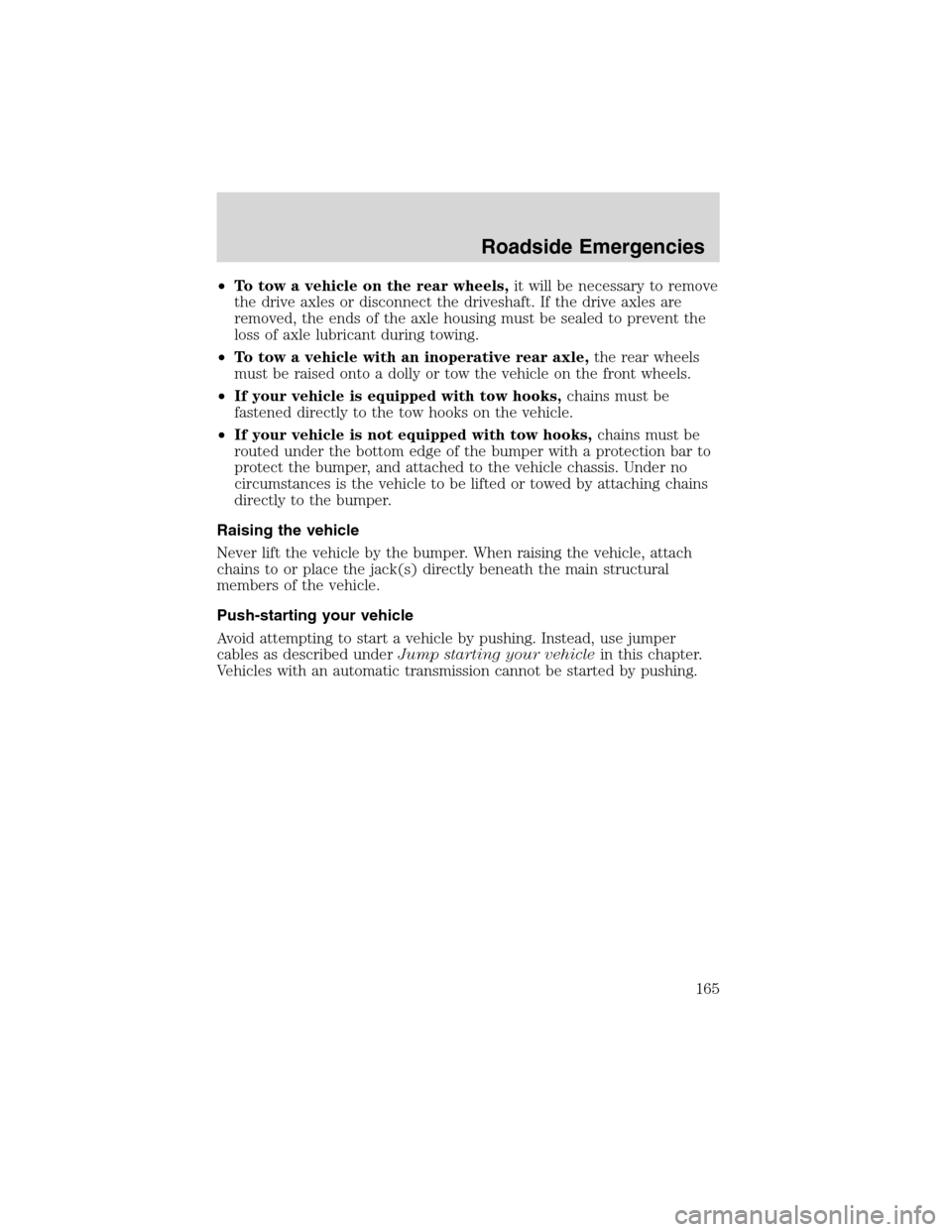
•To tow a vehicle on the rear wheels,it will be necessary to remove
the drive axles or disconnect the driveshaft. If the drive axles are
removed, the ends of the axle housing must be sealed to prevent the
loss of axle lubricant during towing.
•To tow a vehicle with an inoperative rear axle,the rear wheels
must be raised onto a dolly or tow the vehicle on the front wheels.
•If your vehicle is equipped with tow hooks,chains must be
fastened directly to the tow hooks on the vehicle.
•If your vehicle is not equipped with tow hooks,chains must be
routed under the bottom edge of the bumper with a protection bar to
protect the bumper, and attached to the vehicle chassis. Under no
circumstances is the vehicle to be lifted or towed by attaching chains
directly to the bumper.
Raising the vehicle
Never lift the vehicle by the bumper. When raising the vehicle, attach
chains to or place the jack(s) directly beneath the main structural
members of the vehicle.
Push-starting your vehicle
Avoid attempting to start a vehicle by pushing. Instead, use jumper
cables as described underJump starting your vehiclein this chapter.
Vehicles with an automatic transmission cannot be started by pushing.
Roadside Emergencies
165
Page 246 of 248
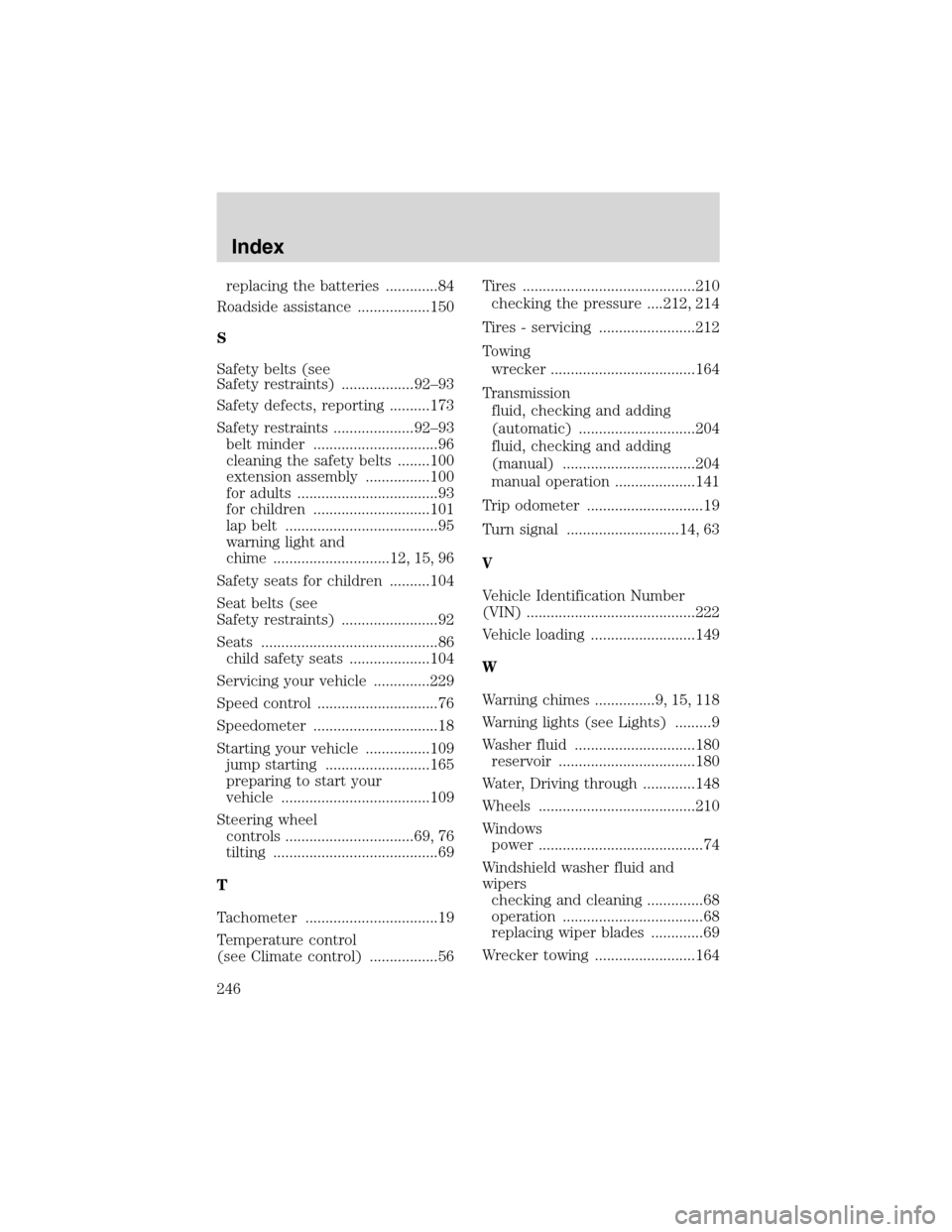
replacing the batteries .............84
Roadside assistance ..................150
S
Safety belts (see
Safety restraints) ..................92–93
Safety defects, reporting ..........173
Safety restraints ....................92–93
belt minder ...............................96
cleaning the safety belts ........100
extension assembly ................100
for adults ...................................93
for children .............................101
lap belt ......................................95
warning light and
chime .............................12, 15, 96
Safety seats for children ..........104
Seat belts (see
Safety restraints) ........................92
Seats ............................................86
child safety seats ....................104
Servicing your vehicle ..............229
Speed control ..............................76
Speedometer ...............................18
Starting your vehicle ................109
jump starting ..........................165
preparing to start your
vehicle .....................................109
Steering wheel
controls ................................69, 76
tilting .........................................69
T
Tachometer .................................19
Temperature control
(see Climate control) .................56Tires ...........................................210
checking the pressure ....212, 214
Tires - servicing ........................212
Towing
wrecker ....................................164
Transmission
fluid, checking and adding
(automatic) .............................204
fluid, checking and adding
(manual) .................................204
manual operation ....................141
Trip odometer .............................19
Turn signal ............................14, 63
V
Vehicle Identification Number
(VIN) ..........................................222
Vehicle loading ..........................149
W
Warning chimes ...............9, 15, 118
Warning lights (see Lights) .........9
Washer fluid ..............................180
reservoir ..................................180
Water, Driving through .............148
Wheels .......................................210
Windows
power .........................................74
Windshield washer fluid and
wipers
checking and cleaning ..............68
operation ...................................68
replacing wiper blades .............69
Wrecker towing .........................164
Index
246